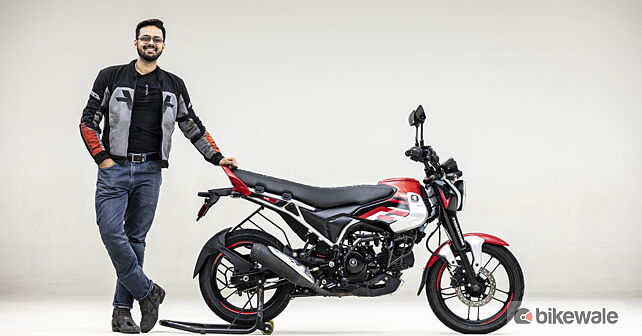Introduction
It was in the early 2000s that CNG was introduced as fuel for vehicles in India. And initially, it was used in retro-fitment containers, followed by being offered as an option from the factory itself. Today, the penetration is so high that CNG cars, buses and three-wheelers are plying on roads across India. As for two-wheelers, the idea of using CNG is not new and has been experimented with before as a retrofit kit. What we have here, however, is the world’s first production CNG motorcycle developed from the ground up by a mass-market brand. Say hello to the Bajaj Freedom!
The curiosity around the motorcycle is profound as of now. Everywhere we went on the bike, we were bombarded with questions around the size of the CNG tank, whether it has a petrol tank, about its combined range, if it rides like a normal motorcycle, and whether it is safe. In a bid to answer these questions, we spent three days riding the bike in the city and on the highway. Let’s see how it went.
The Looks
The Freedom has been designed to take on good roads, bad roads, and everything else that the Indian terrain can throw at it. Interestingly, the design is in line with its go-anywhere persona. It’s unlike any other small-size commuter bike we have seen to date. The exposed trellis frame, flat and long seat, puny fuel tank, braced handlebar, and a steel tube flanking its headlamp lend it a bit of motocross bike vibe. While most of us like its design at BikeWale, some onlookers on the road found it odd. In any case, it does grab eyeballs.
The quality levels are largely impressive. The paint finish, quality of plastic used, and the fitment of the panels are commendable. What put us into a little panic was some water seeping in through the gaps around the fuel filler flap and depositing near the CNG inlet. However, we have been told that it’s not a thing to worry about as long as the CNG inlet is closed properly.
The Package
The CNG tank has been the centre point of the entire architecture of the Freedom and everything else has been put together around it. The 2kg tank sits under the seat and the tubular trellis frame partially encloses it, to enhance safety. Plus, there’s a two-litre petrol tank at the front which acts as the range extender.
Owing to a large space being occupied by the CNG tank, Bajaj had to go with a lot of unconventionally designed and placed components. For instance, the 125cc engine is a horizontally-placed sloper unit, unlike the traditional vertical placement of the engine block. At the rear, the restriction of space made Bajaj go with a link-type vertical monoshock. The rear wheel is a 16-inch unit, unlike most other commuter bikes with 17-inchers. At the front, however, it boasts conventional elements like a 17-inch wheel and telescopic forks.
Although the Freedom is a commuter, it’s not rudimentary in terms of features. The package includes a negative LCD screen which shows all the crucial data. Strangely, there’s no level indicator for petrol though. Also, you can switch from Petrol to CNG mode by just the flick of a switch on the go.
The top-end variant gets Bluetooth connectivity which gives you access to turn-by-turn navigation and SMS and call alerts. Also, there’s a USB charger sitting beside the display. While the most affordable variant gets a halogen headlamp, the higher two variants boast an LED headlamp. The lower two variants get a drum brake at both ends with the top-end trim offering a front disc.
Owing to the paranoia surrounding CNG vehicles, the company has circulated videos of 11 safety tests that the Freedom has been subjected to. Two of the most intense tests include the bike being run over by a truck and a large vehicle colliding head-on into it. In both these scenarios, the CNG tank was intact and the pressure valve indicator stayed in the safe zone. The CNG tank also meets government-mandated safety standards and is certified by the Petroleum and Explosive Safety Organisation. Further, the engine’s internal components are compatible with drier and hotter nature of CNG fuel as compared to petrol.
The Ride
The 825mm seat height is higher than every other 125cc commuter and shorter riders might find it cumbersome to place their feet on the ground at a standstill. People close to 5’10’’, like me, should find it easily manageable though. On the move, it offers an upright, neutral and slightly commanding riding posture. What’s interesting is the longest-in-the-segment seat measuring 785mm which can easily accommodate two large-sized individuals with still some space left.
The Freedom rides just like a conventional petrol-powered motorcycle, even in CNG mode. The engine is fairly smooth until 80kmph of speed with minor buzz emanating beyond that. However, the acceleration is a little mellow for a 125cc bike. Even in the city, you might have to go down a gear or two to overtake vehicles. When you switch to Petrol mode, it feels noticeably peppier but not entertainingly so. This engine is clearly inclined more towards fuel efficiency than performance. But what gives it a little character is a bassy exhaust sound.
The gearbox is smooth and slick for the most part and the clutch can be operated with a single finger. On the handling front, it feels pretty light on its feet and flicking your way through traffic is effortless. It’s only when you move the bike in the parking that it feels slightly top-heavy due to the inclusion of a 16kg CNG tank.
While the front suspension feels absorbent, the rear is tuned slightly on the stiffer side and you feel a little kickback over sharper undulations while riding solo. It feels more settled while riding with a pillion. What is a bit odd is the thud sound you hear coming from the font forks if you don’t slow down enough while going over speed bumps.
The brakes do a decent job of shedding speed with the front disc brake delivering a decent bite and the rear being too progressive. Although it doesn’t get ABS, the CBS functions efficiently enough to prevent the wheels from locking up, as long as you don’t go berserk with braking.
Addressing the most important aspect, the mileage we received in our test was 104km/kg which is more than ARAI-approved 100km/kg. Interestingly, Bajaj claims that even their test returned more fuel efficiency than ARAI but the figures can’t be revealed. Now, when we get the bike for a longer duration, we’ll tank it up at multiple fuel pumps to check how much impact the difference in gas pressure has on the mileage.
Verdict
What we like about the Bajaj Freedom is that it rides like a conventional petrol motorcycle even in CNG mode. The engine is really smooth and there’s nothing odd about its behavior. What’s further impressive is that you can switch between petrol and CNG modes seamlessly. The other basics like the seating comfort, ride quality, brakes, and handling are also sorted and don’t really leave room for complaints. I just felt the acceleration could have been peppier and some people may find the seat height to be a bit tall. But these are things one can live with.
What still remains a big question is whether a CNG bike makes complete sense as of now. Bajaj’s ability to make CNG vehicles is undoubtable given their experience of making CNG three-wheelers for many years. However, what may pose a problem for users is the small CNG tank, short range, and limited infrastructure. Although the amount spent on CNG per kilometer might be half that of petrol but a shorter range means more fuel pump runs. In a few months, the fascination around a CNG motorcycle may fade away and the bike owners might become a part of the long queues at the pumps. Plus, the difference in pressure at different pumps and varying CNG prices region-wise only add to the small caveats. We are also eager to see how this engine ages in the long run and if the performance and range remain the same.
Photography by Kapil Angane
Gallery
1/50
Bajaj Freedom Fuel Tank
Double Tap to Zoom

